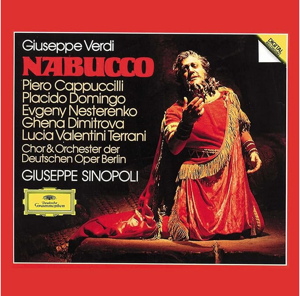
Giuseppe Verdi (1813-1901)
Nabucco (1842)
Piero Cappuccilli (baritone) – Nabucco
Plácido Domingo (tenor) – Ismaele
Evgeny Nesterenko (bass) – Zaccaria
Ghena Dimitrova (soprano) – Abigaille
Lucia Valentini-Terrani (mezzo) – Fenena
Lucia Popp (soprano) – Anna.
Kurt Rydl (bass) – High Priest of Baal
Volker Horn (tenor) – Abdallo
Chorus and Orchestra of the Deutsche Opera Berlin/Giuseppe Sinopoli
rec. 1982; SFB, Grosser Sendesaal, Berlin, Germany
Deutsche Grammophon 4860041 [2 CDs: 123]
Verdi’s third opera has rarely been as well served on recording as it was on this 1982 version from Deutsche Grammophon. The sessions were scheduled after the runaway success of a production at the Deutsche Oper, which confirmed the growing reputation of Giuseppe Sinopoli as a conductor of special note in the standard Italian repertoire. Sinopoli puts a very personal stamp on a score which too often emerges as an evening of rum-ti-tum-tum. Sinopoli looks to highlight the small passages of elegance that are sometimes buried in Verdi’s orchestration. He still supplies plenty of vitality but he also mines a surprising amount of expressiveness as one can hear in the overture. In this respect Sinopoli owns the score far more than Riccardo Muti did when he came to record it for EMI (review). He certainly gets some very crisp playing from the Berliners, who seem quite galvanized by his presence.
Piero Cappuccilli is a patrician singer among the baritones who have tackled the title role. The reliability of his firm tone is never in doubt but it is the rounded beauty of his tone which commands the listener’s attention. Such pieces as the mad scene or his contribution to the duet with Abigaille are really transformed by the long phrases that he takes, often in a single breath. He also has a good feel for the dramatic highs and lows of the part. Again, in the Duet with Abigaille one can hear him and Ghena Dimitrova striking sparks off one another.
If Ghena Dimitrova had never made another recording this one would ensure a special place for her in the pantheon of singers. I will remember attending a performance of Turandot several decades ago. When she opened her mouth to sing I just about fell out of my seat because her voice was that powerful. The engineers have captured her voice rather well, which must have been something of a challenge for them. She has a dark, covered-sounding lower range; it gradually gets larger as she moves up the scale, until her top voice opens out, with all of the power of a nuclear generating station. She is not just a powerhouse singer though; she is tenderly expressive in her big aria, and her death scene is a strikingly accomplished vocal portrait. Overall her singing is more disciplined than that of the exciting but vocally unruly singing of Elena Souliotis on the Gardelli recording (review).
Evgeny Nesterenko is a wonderfully resonant Zaccaria. The Russian bass has a firm, liquid tone which is evenly distributed throughout his range. Once or twice he slips a bit off pitch but this does not really mar his performance overall. One looks forward to each of his warmly delivered solo scenes that are sprinkled throughout the opera.
The rest of the cast have smaller roles in which to make an impact. Ismaele is a stock romantic tenor role with nothing special for the tenor to sink his teeth into. Plácido Domingo does what he can with it, and one is grateful to hear such a firmly sung, burnished sound in the role. The darkly dramatic voice of bel canto specialist Lucia Valentini-Terrani is utterly wasted on Fenena, which calls for a more lyric mezzo. She does sing her little aria quite nicely, even if her timbre overwhelms the piece somewhat. In the small role of Anna, DG called upon star soprano Lucia Popp, whose characteristic tonality clearly floats above many of the big ensembles. The quality of this studio recording is fairly good although the acoustic flatters the orchestra and chorus more than it does the soloists, who have been left with very little ambience around their voices. The Berlin Orchestra plays splendidly for Sinopoli and the Chorus display finely controlled dynamic shading in “Va pensiero”. Despite minor flaws here and there the overall impression this recording leaves is one of surprise at how Sinopoli reveals a hitherto unsuspected depth in this early work of Verdi. After hearing the entire opera, I wanted to begin listening to it all over again; surely that is the mark of a successful recording.
Mike Parr
Help us financially by purchasing from



















